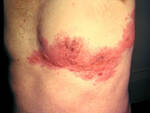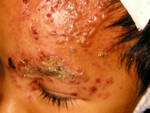
23 Nov Herpes Zoster: Persistent Increased Risk of Cardiac Event or Stroke After Shingles
MedicalResearch.com Interview with:|

Dr. Curhan
Sharon G. Curhan, MD, ScM|
Director, CHEARS: The Conservation of Hearing Study
Channing Division of Network Medicine
Department of Medicine
Brigham and Women’s Hospital
Harvard Medical School
Boston, MA 02114
MedicalResearch.com: What is the background for this study?
Response: Herpes zoster, commonly known as “shingles,” is a viral infection that often causes a painful rash. Shingles can occur anywhere on the head or body. Shingles is caused by the varicella zoster virus (VZV), the same virus that causes chickenpox. After a person has chickenpox, the virus stays in their body for the rest of their life. Years and even decades later, the virus may reactivate as shingles. Almost all individuals age 50 years and older in the US have been infected with the varicella zoster virus and therefore they are at risk for shingles.
About 1 in 3 people will develop shingles during their lifetime, and since age is a risk factor for shingles, this number may increase as the population ages. The risk is also higher among individuals of any age who are immunocompromised due to disease or treatment. A number of serious complications can occur when a person develops shingles, such as post-herpetic neuralgia (long-lasting pain), but there was limited information on whether there are other adverse long-term health implications of developing shingles.
There is a growing body of evidence that links VZV, the virus that causes shingles, to vascular disease. VZV vasculopathy may cause damage to blood vessels and increase the risk of stroke or coronary heart disease. Although some previous studies showed a higher risk of stroke or heart attack around the time of the shingles infection, it was not known whether this higher risk persisted in the long term. Therefore, the question we aimed to address in this study was to investigate whether shingles is associated with higher long-term risk of stroke or coronary heart disease.
To address this question, we conducted a prospective longitudinal study in 3 large US cohorts of >200,000 women and men, the Nurses’ Health Study (>79,000 women), the Nurses’ Health Study II (almost 94,000 women) and the Health Professionals Follow-Up Study (>31,000 men), without a prior history of stroke or coronary heart disease. We collected information on shingles, stroke and coronary heart disease on biennial questionnaires and confirmed the diagnoses with medical record review. We followed the participants for up to 16 years and evaluated whether those who had developed shingles were at higher risk for stroke or coronary heart disease years after the shingles episode. The outcomes we measured were incident stroke, incident coronary heart disease [defined as having a non-fatal or fatal myocardial infarction (heart attack) or a coronary revascularization procedure (CABG, coronary artery bypass graft or percutaneous transluminal coronary angioplasty)]. We also evaluated a combined outcome of cardiovascular disease, which included either stroke or coronary heart disease, whichever came first.
MedicalResearch.com: What are the main findings?

Herpes Zoster Chest
DermNet NZ image
Response: Our study showed that shingles is associated with about 30% higher long-term risk of a major cardiovascular event, and the elevated risk may persist for 12 years or more after having shingles. Specifically, compared with individuals with no history of shingles, the elevated risk was up to 38% higher risk for stroke: in pooled multivariable analyses accounting for multiple potential confounding factors, the multivariable-adjusted hazard ratios (MVHRs, 95% CIs) for incident stroke were 1.05 (0.88–1.25) among those with 1 to 4 years since HZ, 1.38 (1.10–1.74) among those with 5 to 8 years since shingles (HZ), 1.28 (1.03–1.59) among those with 9 to 12years since HZ, and 1.19 (0.90–1.56) among those with ≥13years since HZ.
For coronary heart disease (CHD), the elevated risk was up to 25% higher: in pooled multivariable analyses, compared with individuals with no history of HZ, the MVHRs (95% CIs) for incident CHD were 1.13 (1.01–1.27) among those with 1 to 4 years since HZ, 1.16 (1.02–1.32) among those with 5 to 8 years since HZ, 1.25 (1.07–1.46) among those with 9 to 12 years since HZ, and 1.00 (0.83–1.21) among those with ≥13years since HZ. In addition, there was a suggestion that the magnitude of the elevated risk may be greater among those with potentially immunocompromising conditions.
MedicalResearch.com: What should readers take away from your report?
Response: Our findings showed that a history of shingles is associated with higher long-term risk of a major cardiovascular event. Our findings suggest there are long-term implications of shingles and highlight the importance of public health efforts for prevention.
Given the growing number of Americans at risk for this painful and often disabling disease and the availability of an effective vaccine, shingles vaccination could provide a valuable opportunity to reduce the burden on shingles and reduce the risk of subsequent cardiovascular complications.
MedicalResearch.com: What recommendations do you have for future research as a results of this study?

Herpes Zoster – Shingles of Face: DermNet NZ image
Response: Due to the timing of our study, much of the study period took place before the shingles vaccine became widely available; even once it was introduced, the uptake was generally low. The more recent non-live, recombinant subunit adjuvanted vaccine was not available until after the end of follow-up in our study. Therefore, we were not able to evaluate whether vaccination status may influence the association of shingles and long-term risk of a major cardiovascular event.
As uptake of the newer shingles vaccine increases, future studies that evaluate whether vaccination status influences the relation of shingles and risk of cardiovascular disease would be informative. We are currently collecting this information among our participants and hope to conduct these studies in the future.
Disclosures: Disclosures: Dr S. G. Curhan received an investigator‐initiated grant from GlaxoSmithKline Biologicals SA to examine the long‐term outcomes potentially associated with herpes zoster. Dr Yawn reports consulting with GlaxoSmithKline related to herpes zoster epidemiology and receipt of an investigator‐initiated grant related to herpes zoster and chronic obstructive pulmonary disease. Dr Kawai was employed by Boston Children’s Hospital during the study and is now an employee of and a shareholder in Moderna, Inc. Dr G. C. Curhan is an employee of OM1, and receives royalties from UpToDate for being an author and Section Editor. The remaining authors have no disclosures to report.
Citation:
Herpes Zoster and Long‐Term Risk of Cardiovascular Disease
Sharon G. Curhan MD, ScM scurhan@bwh.harvard.edu , Kosuke Kawai ScD , Barbara Yawn MD, MSc , Kathryn M. Rexrode MD, MPH , Eric B. Rimm ScD , and Gary C. Curhan MD, ScD 16 Nov 2022
The information on MedicalResearch.com is provided for educational purposes only, and is in no way intended to diagnose, cure, or treat any medical or other condition. Always seek the advice of your physician or other qualified health and ask your doctor any questions you may have regarding a medical condition. In addition to all other limitations and disclaimers in this agreement, service provider and its third party providers disclaim any liability or loss in connection with the content provided on this website.
Last Updated on November 23, 2022 by Marie Benz MD FAAD
